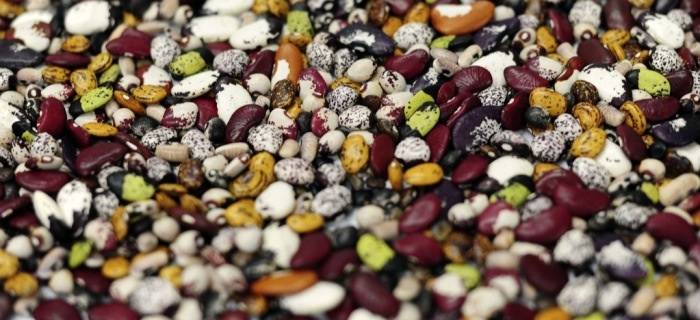Beans, the Wonderful Fruit

Without beans where would Jack be? Though there are no magic beans outside of fairytales, they can seem to magically stretch your food dollars.
"Oh, beans," you may say. "They take too long to cook, and then...well...YOU know. Plus they're boring. How many times can you eat chili?"
Balderdash. Beans take hardly any time to cook if you know a couple of tricks (and if you don't use beans that have sat on your shelf for the last five years). There are hundreds if not thousands of things you can do with them. They're so versatile you can make everything from appetizers to dessert with them--yes, dessert! But we're getting ahead of ourselves.
They're really, really good for you--low in fat, high in protein and fiber, lots of vitamins and minerals. A cheaper protein source cannot be found, easy to store, easy to cook, and popular in just about every cuisine in the world. Seneca Indians believed the bean to be a special gift from the creator. Barbara says, "I tend to agree with them."
And as for...well...YOU know, the more beans you eat, the better you tolerate them--if not, there's always Beano!

Speedy beans
There are two quick ways to cook beans that don't require soaking them all night: Pressure cooking; and pre-boiling.
Pressure cookers are not the unpredictable devices they were in the old days, when dinner was liable to end up on the ceiling rather than on your plate. Beans that would normally take a couple of hours in the pot can be done in 15 minutes, and the versatile cookers can be used to flash-cook just about anything from lentils to pot roast with great retention of nutrients and terrific flavor. The folks who have them swear by them, to the point that they get rid of their microwaves. Lorna Sass has written a number of whole foods cookbooks on using pressure cookers, and Lynn recommends all of them (whether you have a cooker or not--Lorna always provides alternate cooking methods).
We are not pressure cooker people (Lynn owns a pressure canner but hasn't really put it to use). So what we do to speed up bean cooking times is either soak them overnight, "pre-boil" them, or use a crock pot.
Step by Step:
- BEFORE YOU EVEN THINK ABOUT COOKING BEANS, how long have they been sitting on your pantry shelf? If the answer is lost in the dust bunnies behind the fridge, throw them out and get new beans. The longer they sit, the more the nutrition degrades and the longer they take to cook. Beans are best used within a year, though they can last indefinitely; in other words, if it's an emergency and you're down to that last sack of dry beans of unknown date, go ahead and cook them. Nothing bad will happen. Store dry beans in an airtight container at room temperature in a dry place; don't store uncooked beans in the fridge.
- Sort through the beans, looking for rocks and dirt; get out any yucky-looking or broken beans too. Rinse well.
- Soak beans overnight in twice as much water plus a sprinkling of salt OR pre-boil them: Put your beans in the pot with the cooking liquid, slap the lid on, boil them at a full roll for about two minutes, turn off the heat and let them sit for at least an hour. It shortens things up considerably, nearly equivalent to an overnight soak.
- Unless your specific recipe tells you differently, place the soaked (or pre-boiled), rinsed beans in a large pan with fresh water. Water level should come to about one inch above the beans, approximately 5 cups of water for every cup of beans. Remember: Beans triple their size when cooked. Use a big pan. Overboiling beans are messy.
- To test for doneness, bite-taste a few beans. They should be tender, but not mushy. Or open a bean with a fork resting the bean on a spoon.
Bean Tips:
- Beans can be cooked and then frozen to use later for up to 6 months. Barbara freezes mashed beans in 2-4 cup amounts for easy meals.
- Never add anything acidic, such as tomatoes, vinegar, wine or citrus juices, while the beans are cooking. Add these type of ingredients only after the beans are almost tender. Why? Acids slow down the absorption of liquids.
- When cooling, keep the beans in their cooking liquid to prevent them from drying out.
- When reheating beans, add a tablespoon or two of water.
A bit musical?
If you're sensitive to...well...YOU know, there are some things you can do before you resort to Beano:
Presoak your beans overnight. The longer the soaking time, the greater the amount of gas-causing properties (technically, the term is oligosaccharides) that will dissolve in the water. Then you rinse them away and start with clean water.
You can also rinse pre-boiled or partially cooked beans, though this can rob you of some of the nutrients. The best time to rinse beans for gas control is when the skin breaks when blown; rest a bean on a spoon and gently blow on it. The skin will split and curl.
Finally, just eat a lot of beans and suffer for a bit! Really, it's the best cure--eat lots of them, your system acclimates (though never completely loses its, uh, musical aptitude unfortunately).
